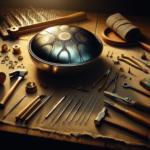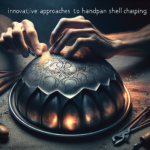The handpan, an enchanting and relatively new musical instrument, has captivated the hearts of many with its ethereal tones and meditative sounds. Yet, even among the most passionate players, there is always room for growth and improvement. This is where ‘Octave Magic’ comes in—a sophisticated technique aimed at elevating your handpan skills to new heights. Whether you are a novice or a seasoned player, understanding and mastering the concept of octave magic can significantly enhance your playing experience.
What is Octave Magic?
Octave magic is a term used to describe a series of advanced techniques that focus on the interplay of octaves on the handpan. In simplest terms, an octave is the interval between one musical pitch and another with half or double its frequency. By manipulating these octaves skillfully, you can create more dynamic, engaging, and mesmerizing compositions.
The Science Behind Octave Magic
At its core, octave magic leverages the natural harmonics and overtones present in the handpan. Each note on the handpan has built-in harmonic overtones, including octave intervals. When you strike these notes in specific ways, you can bring out these harmonics, creating a richer and more complex sound. Understanding the physics of sound waves and frequencies can give you an edge in mastering this technique.
The Role of Handpan Tuning
It is essential that your handpan is well-tuned to achieve optimal results with octave magic. A carefully tuned handpan ensures that the overtones and harmonics align perfectly, making it easier to produce clean, melodious sounds. Most quality handpans are tuned in a specific scale or key, and knowing your instrument’s scale can help you make the most out of octave magic.
How to Practice Octave Magic
Basic Exercises
Before diving into complex compositions, start with these fundamental exercises to get a feel for octave magic:
- Single Note Repetition: Choose a single note on your handpan and strike it repeatedly, paying attention to its natural harmonics. Once comfortable, try playing the same note one octave higher or lower.
- Transition Between Octaves: Practice transitioning between a note and its octave smoothly. For instance, if you’re playing a C note, alternate between C3 and C4.
- Simple Scales: Play scales up and down the handpan, emphasizing the octave notes as you go.
Advanced Techniques
Once you’re comfortable with basic exercises, move on to more advanced techniques:
- Polyrhythmic Patterns: Experiment with playing different notes in each hand, focusing on octave combinations to create polyrhythmic patterns. This will add complexity and richness to your performance.
- Chord Progressions: Utilize octave intervals to play chord progressions. For example, if you’re playing a C major chord (C-E-G), try to include the octave notes (C4 and C5) to add layers to your sound.
- Melodic Improvisation: Incorporate octave magic into your improvisations. Experiment with ascending and descending octaves to create dynamic melodies.
Applications in Different Playing Styles
Traditional
In traditional handpan playing, octave magic can be used to embellish melodies and add depth to simple compositions. It can also be incorporated into folk or classical tunes, rendering them more engaging and vibrant.
Contemporary
For those interested in modern styles, octave magic offers endless possibilities. It can be integrated into electronic music, jazz, and experimental genres. Adding octaves can create a fuller sound, making your handpan an indispensable part of a contemporary musical ensemble.
Meditative
The meditative aspect of handpan playing can greatly benefit from octave magic. The rich, harmonic overtones can elevate the meditative quality of your music, aiding in relaxation and mindfulness practices. The soothing nature of octave intervals can create an immersive, tranquil experience for both player and listener.
Common Pitfalls and Solutions
As with any advanced technique, there are common pitfalls when attempting to master octave magic. Here’s how to overcome them:
Overcomplication
It’s easy to get carried away and overcomplicate your playing. Remember that simplicity is often more effective. Focus on clean, clear notes and simple octave transitions before adding more complexity.
Improper Hand Position
Ensure that your hand positioning allows for maximum control and precision. Practicing proper strike techniques and hand positioning will improve your consistency and sound quality.
Lack of Rhythm
Maintaining a consistent rhythm is crucial. Use a metronome to keep time and practice slowly to ensure you nail the technique before speeding up.
Conclusion
Octave magic is more than just a technique; it’s a pathway to deeper emotional expression and technical mastery on the handpan. By incorporating octave intervals, leveraging harmonics, and practicing diligently, you can significantly elevate your playing skills. Whether you aim to captivate an audience, integrate into diverse musical genres, or simply enrich your personal playing experience, octave magic has something special to offer.
Mastering octave magic takes time and effort, but the rewards are immensely gratifying. As you progress, you’ll find that the possibilities are virtually endless, allowing you to craft unique, captivating pieces that showcase the full potential of your handpan.
Frequently Asked Questions
-
Q1: How long does it take to master octave magic on the handpan?
A: The time it takes varies per individual. With regular practice, most players can start executing basic octave techniques within a few weeks. Mastery, however, can take several months to years depending on the complexity of techniques and one’s dedication.
-
Q2: Can I practice octave magic on any type of handpan?
A: Yes, though it is essential that the handpan is well-tuned. High-quality handpans tuned to a specific scale or key will yield the best results as their harmonics and overtones will align more perfectly.
-
Q3: Do I need to understand music theory to apply octave magic?
A: While a basic understanding of music theory can be beneficial, it is not mandatory. Practical experience and attentive listening are equally effective ways to grasp octave magic.
-
Q4: What are the benefits of learning octave magic for meditation?
A: Octave magic creates richer, more complex sounds that can enhance the meditative qualities of handpan music. This can aid in creating a more immersive and tranquil experience, beneficial for both personal meditation and guided sessions.
-
Q5: How can I incorporate octave magic into my existing playing style?
A: Start by integrating simple octave transitions into your current repertoire. Gradually experiment with more complex patterns and harmonics. Listening to recordings of skilled players can also provide inspiration and insight.





